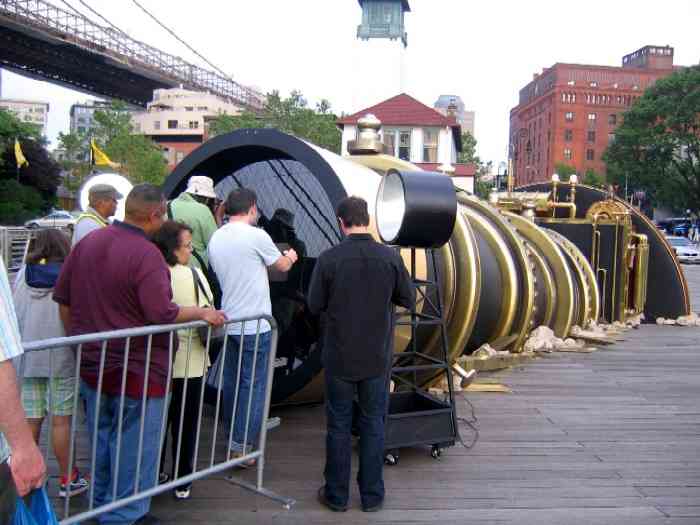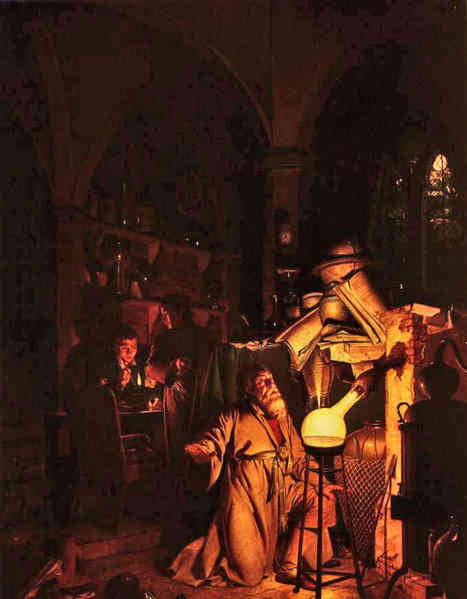
The pianists, Marc Peloquin and Roberto Hidalgo (a.k.a. ‘Split-Second Piano Ensemble), gave an imaginative and exciting recital last night at Bargemusic at Fulton’s Landing in Brooklyn, to an enthusiastic audience of about 120 people.

- Thomson—Synthetic Waltzes (1925)
- Lavista—Simurg (1980)
- Burke—Alchemy (2007)
- Crumb—Makrokosmos IV (1979)
- Barber—Souvenirs (1952)

Bargemusic is a vintage-1900 boat moored just south of the Brooklyn Bridge that is the venue for an extensive program of chamber music that runs year-round. Violinist-violist Olga Bloom and her supporters present more than 200 chamber music performances on the boat each year in the main salon, which has a seating area about 15 x 9 meters in size and a 5 meters-deep stage on the outboard/stern side.

The Virgil Thomson duet is a character piece, with abundant evocations of Americana; post-World War I moods; descriptive specificity of a self-prepossessed nationalism; and the supremacy of ‘idea’, in a way that seems sweet and untenable these days.
Simurg is Mario Lavista’s solo piano work that is a meditation on ideas in author Jorge Luis Borges’s Book of Imaginary Beings. In the book, the simurg is the ‘king’ of all birds. (From Lavista’s composition, we must conclude that the simurg is a raptor of unusual size. The simurg spends much of its pianistic time waiting, 13 minutes of atonal, percussive lurking-for-something-to-kill. It is obvious Hidalgo inhabits this creature with gusto; the piece provides an opportunity for aggression, indulging in acting-out that must ordinarily be kept in-check in normal civil society. I suspect the simurg may be the urbane Hidalgo’s alter-ego… ) The indolence of this piece accurately replicates the milieu in the Borges chapter on the simurg. Some imaginary beings are sentient, perhaps more so than many humans. But, by contrast, the imaginary simurg seems to have difficulty imagining its own purpose, other than doing what it does—lurking and killing, manifesting and preserving its malevolent power. It is anti-sentient: unfeeling, uncaring, destructive. (In Iranian legend, the simurg is so old that it has seen the destruction of the world three times already. The frightening timeliness and cautionary political relevance of this nihilistic image in today’s world could not have been clearer.)

Peloquin’s world-premiere performance of Stephen Burke’s Alchemy revealed this post-atonal piece to be a sculptural essay in chromatics—ethereal, with no clear time-signature. The sustained pedal caused some of the passages to be pretty muddy, although the geometry/acoustics of the barge performance salon did Peloquin no favors in this regard. Alchemists notoriously search and search and fail to ‘find’ [the method to transmute lead into gold], a failure for which Burke takes them to task. The succession of Burke’s sculptural ‘mass-of-sound’ gestures reveals the quixotic nature of alchemical self-deceptions—truthy assertions of dubious trajectory, hermetical inquiries without a discernable rationale or story, abstruse but diverting exercises that, in the end, disserve humankind. (Stephen is a 1984 graduate of The Juilliard School, not the Steve Burke who is a prodigious video-game composer, including the score for Kameo: Elements of Power (Xbox-360).)

The Crumb piece was superb. Makrokosmos IV is a 28-minute tour-de-force in 4 movements, for 4 hands playing a miked-amplified prepared piano (3 stainless steel rulers inside, laying on the tuning pins). Prolific sonic textures involving both pianists repeatedly up and off the bench and reaching inside the piano to pluck, damp, de-tune, thump upon, and otherwise tamper with the inner workings of the instrument to create myriad effects.

At one point, even the page-turner was engaged to knock on the cast-iron armature of the Steinway and assist in evoking imagery of super-nova celestial processes. The emulation of stellar coronal flares was particularly impressive. It’s a violent-but-beautiful universe according to Crumb, and Peloquin and Hidalgo gave a faithful rendering of that naturalistic/pantheistic viewpoint, assisted with a single cardioid dynamic mike running into a 60-watt Roland guitar amp with a little bit of added reverb. (In a way, the Crumb piece was a continuation of the anti-anthropocentric political re-calibration that was introduced in the Lavista piece, Simurg. It is a universe in which humankind does not have a pre-designed, God-given place; indeed, in which humankind has no cosmic friend at all; beauty in the here and now, with difficulty and no possibility of redemption. )

The Samuel Barber piece, Souvenirs, is an amusing 4-handed character piece that is seldom performed in public settings—receiving here on the barge a convincing reincarnation in the hands of Hidalgo and Peloquin. (Barber evidently had a sardonic fit at the age of 42 when he composed this duet, a critical comment on the esoteric/illogical quality of what is collected: the very nature of what it is to be a ‘souvenir’ and what it means to ‘collect’ such things are lampooned. The ‘Hesitation Tango’ is itself worth the price of admission.)

Peloquin and Hidalgo performed a wry, over-the-top Brahms Hungarian folkmusic send-up as a dazzling-humorous encore, as the barge swayed gently in the East River chop. One of the nicest chamber music outings ever for a delighted crowd ranging from 8 to 80 years old, in a charming, unusual venue. The illustrious and extroverted Olga Bloom gave warm, personal thank-yous to each of us as we departed via the gang-plank. Bravo!

- Bargemusic website
- Marc Peloquin website
- Roberto Hidalgo website
- Steve Burke page on MySpace
- Free scores for Brahms piano works for 4 hands
- Virgil Thomson page at ArtOfTheStates
- Brooklyn-London telectroscope videos

No comments:
Post a Comment